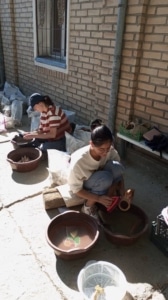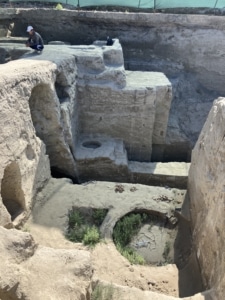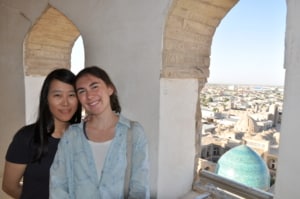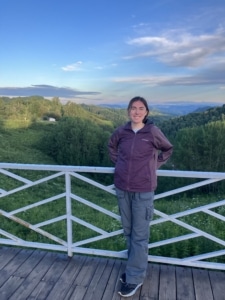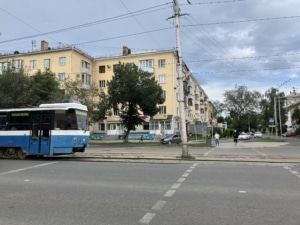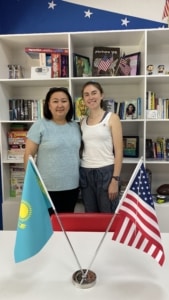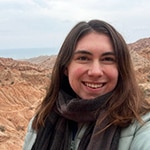On the flight home from my first study abroad trip to Kyrgyzstan, I was already imagining how and when I would be able to return to the country I had grown to love. Less than a year later— 359 days, to be exact—I was elated to see that dream realized, this time landing in Bishkek as SRAS Student Coordinator.
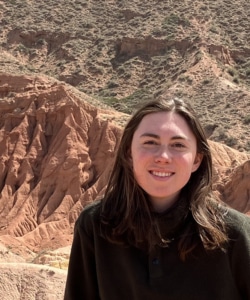
But before I arrived back in Kyrgyzstan, I got a taste of life in two other Central Asian countries, Uzbekistan and Kazakhstan. This past May, I arrived in Bukhara, one of Uzbekistan’s fabled cities of the old Silk Road, to work on an archeology expedition for about a month. I had no previous experience in archeology, so I found myself soaking up new information from the scholars around me at every moment of the day. Most of my work was on the back-end of the archeology process: cleaning animal bones and ceramics, registering them, and storing them. I also used a new piece of technology which laser-captures the profiles of ceramic shards. Due to property laws, all of the items we found on the dig would stay in Uzbekistan, so every single piece of ceramics had to be either hand drawn or digitally captured in order to create a record that could be analyzed once everyone left for their respective home universities. With people from Uzbekistan, Kyrgyzstan, Tajikistan, the U.S., China, Germany, Russia, the UK, and elsewhere, the team had a vibrant intellectual energy and even casual dinner conversations proved to be eye-opening.
My next destination was Öskemen, Kazakhstan. Coming from the arid climate of Bukhara, the first thing that struck me when I arrived in Öskemen was the lush greenery of tall pine trees and colorful flowers populating the yards and lining the sidewalks. Additionally, the city has a much more industrial and Soviet feel than Bukhara has. After dropping off my luggage at my apartment, I headed to the American Corner at the public library, where I would be leading an English speaking club and taking Kazakh lessons for the next three weeks. At the library, I was met by a group of bright-eyed students who regularly held their own volunteer clubs at the American Corner and who were there to create a schedule for me that included visits to all of the must-see sites in the city. I was overwhelmed by their generosity, and the rest of my stay did not disappoint. Thanks to the friends I made at the library and my fantastic Kazakh language tutor, I became well acquainted with the city and was eventually able to string together enough words to have a somewhat functional conversation in Kazakh. Saying goodbye was hard, but it didn’t feel like a forever-goodbye given that my next destination was not too far away: Bishkek!
I’m not sure what exactly made me fall in love with Bishkek, but something about it had caused me to envision myself living and working here even before my first stay was over. During my semester abroad here, each day felt like an opportunity to discover something new and grow as a person— whether it was purchasing unfamiliar dairy products from the small bazaar on my way home, trying intriguing coffee concoctions like сырный латте (which had a vague taste of blue cheese) or бамбл кофе (espresso and orange juice) at one of the city’s countless coffee shops, or the daily thrill of pushing myself through a marshrutka (mini bus) and yelling out на остановке остановите, пожалуйста! (and the eventual satisfaction I got from nailing the process). On weekends, I’d pick a park I hadn’t been to before and walk there as a way to explore more streets. By the end of my seven months here, I felt at home in the city. I no longer needed a map to orient myself back home from most neighborhoods, but my long list of places to check out, which I had compiled from Instagram ads, word-of-mouth, and wandering about, was nowhere near complete and beckoned me to stay longer.
Also calling me back were the wonderful people I had met, some of whom I had grown extremely close to and some of whom I admired from a distance. I love the energy among my generation here, in particular their curiosity about the world, their creativity, and their determination to get things done, and I am eager to develop a community here. And finally, I am excited to continue refining my Russian and improving my Kyrgyz by immersing myself in daily social interactions here, stopping to read as many dual-language signs and advertisements as I can, and studying Kyrgyz in the classroom.
After my adventures in Bukhara and Öskemen, coming back to Bishkek truly felt like coming “home”. It has been two weeks since I moved, but I am just as excited for my upcoming time here as I was before my plane took off the ground.


